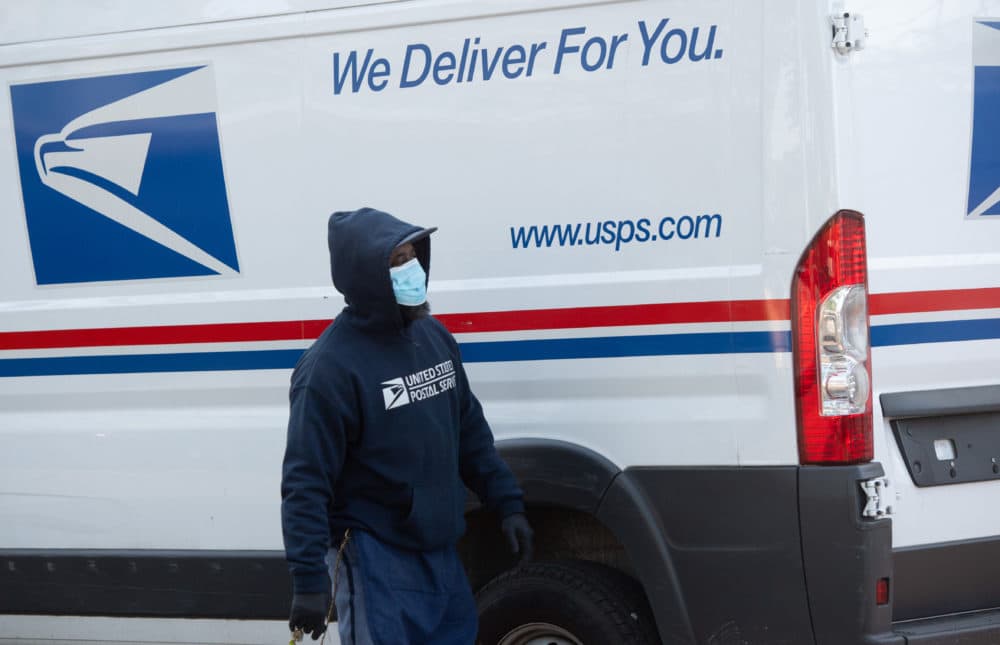Advertisement
U.S. Postal Service Stands To Suffer Huge Losses From Coronavirus Pandemic
Resume
Now more than ever, many Americans are relying on the U.S. Postal Service to deliver not only mail, but also food and medicine during the coronavirus pandemic.
But the already struggling postal service could be in financial jeopardy without federal help, and the Trump administration appears opposed to bailing it out.
Postmaster General Megan Brennan told House lawmakers earlier this month that the pandemic is causing an unprecedented drop in mail. The agency is anticipating a loss of $13 billion in revenue this fiscal year due to the crisis and another $54 billion in losses over 10 years.
“I think the Trump administration is playing a costly game of chicken with the post office,” says Philip Rubio, professor of history at North Carolina Agricultural and Technical State University and a former postal worker. “I really don't think they want to run it into the ground in an election year.”
Postal workers remain on the frontlines of the pandemic since they are designated essential workers. Nearly 700 of the agency’s 630,000 postal workers have tested positive for COVID-19, a USPS spokesperson told ABC News.
“We can count on the post office, but what we have to be afraid of is Congress not doing their job, and President Trump apparently willing to take that chance,” Rubio says. “So what happens next? We don't know.”
The contentious relationship between the federal government and the postal service goes back to the U.S. postal strike of 1970, Rubio says.
Postal workers were tired of barely seeing a living wage with many of them on welfare while working for the federal government, he says. The Nixon administration proposed turning the post office into a corporate-like agency that wouldn’t rely on the federal government for funding.
The two sides came up with a compromise, which reorganized the postal service into an independent agency and gave workers collective bargaining.
“It's part government agency and part corporation because postal workers are the only government employees who enjoy full collective bargaining rights,” Rubio explains. “But on the other hand, Congress also directed the postal service to become self-supporting. They have not received any federal funds, in fact, since 1982.”
The postal service has faced routine financial problems starting back in 2006, Rubio says, when the Bush administration passed the Postal Accountability and Enhancement Act to deal with the tens of billions of dollars of debt the USPS had gotten itself into by overpaying pension funds.
“They had forced the postal service to have to pony up $5.5 billion a year for 10 years, paying it forward for retiree health benefits [for] 75 years,” he says. “In other words, retirees who hadn't been born yet, much less taken the postal exam.”
When the Great Recession hit in 2009, the USPS really “started to bleed red ink,” Rubio says. Congress refused to repeal the 2006 law nor did it bailout the postal service, which meant the agency had to resort to panic austerity measures that were largely ineffective.
Congressional lawmakers tried to bailout the postal service in last month’s $2 trillion stimulus package, but the Trump administration refused to cooperate. Rep. Carolyn B. Maloney (D-NY), chair of the House Oversight Committee, said providing financial relief was crucial to keeping the postal service afloat.
“Unless Congress and the White House provide meaningful relief in the next stimulus bill, the Postal Service could cease to exist,” she said.
The federal government has been reluctant to bail out the postal service, despite it being essential for just about everyone in the country. Rubio says it all goes back to the postal strike and conservatives’ longstanding goal of making mail service private.
“There has been a longstanding conservative agenda that has regarded the postal service — and even before that the post office — as a dinosaur from the past or socialistic or something that should be privatized with its most lucrative services sold off to private carriers like UPS or to FedEx,” he says. “And what happened with the postal financial crisis of 2009 is it provided that kind of, I guess you could say, self-fulfilling prophecy.”
Cristina Kim produced and edited this interview for broadcast with Kathleen McKenna. Samantha Raphelson adapted it for the web.
This segment aired on April 21, 2020.

